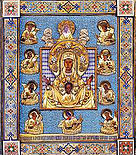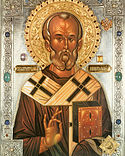Additional Questions and Answers have been added
There are many citations on the website Internet-Sobor from the Holy Fathers in judgment of your schism.
Division of any kind in the Church, regardless on what level it occurs, is a tragedy, though not all such divisions can be considered schisms as understood by the canons and the Holy Fathers.
Those who speak of the current divisions in the church and label it a schism are consciously or subconsciously subverting the concept. Schism is when unity with the universal Church is violated. Those who call us schismatic show that they believe that the Odessa synod is the Russian local Church, but such a belief is absurd. From its very founding, the ROCA considered itself only a part of the Russian Church. When the ROCA joined with the Moscow Patriarchia in 2007, those who did not agree with the decision, found themselves divided into many administrative church bodies, commonly called “fragments.” So, the Odessa synod is not the entirety of the Russian Church, but only a “fragment” of its part.
The danger of schism is that it is a separation from the universal Church. If separation from the synod in Odessa is a separation from the universal Church, then it follows that all who are not in communion with the synod in Odessa find themselves outside the Church. Yet, the Metropolitan Agafangel himself never held such beliefs. On the contrary, in his writings and actions he recognized the relative canonicity of the other “fragments.” (The canonicity of all the present “fragments,” including the Odessa synod, can be questioned to some degree.) For example, Metropolitan Agafangel accepted Bishops Dionisiy, Iriney and Anastasiy, who were consecrated by other “fragments,” in their existing office without cheirothesia.
In this way, separation from the synod of Metropolitan Agafangel is not a departure from the Church, i.e. schism, and applying “fearful” citations from the Holy Fathers to our circumstances is an intentional or unintentional deception.
How should one call such divisions within the “fragments”?
An answer grounded in the canons cannot be given to such a question, simply because these very “fragments,” i.e. microscopic church jurisdictions existing autonomously, are not provided for in the canons. This should not be forgotten by those who enjoy discoursing loudly about the canons and applying them to our circumstances. The canons present a universal Church made up of united local Churches, along with various divided groups of schismatics, who are outcasts from the Church. In our day, just the opposite is true. What we consider the universal Church is made up of divided “fragments,” which do not associate with each other. Further divisions within the “fragments” can be called “divisions of the church administration.”
If we break with the Odessa synod, we will lose contact with the family of antiecumenical Churches?
These are very unfortunate circumstances, though it does not follow at all that we will fall away from the Church because of this division. To confirm that, let us consider, for example, the synod of Archbishop Tikhon (Pasechnik), who is not in communion with the Kallinikos synod. Let us ask ourselves, why? Is the synod of Archbishop Tikhon less Orthodox than the Odessa synod? Certainly, not. It can be explained by developments in the relations between the bishops of both synods, a topic best avoided at this time. For the fact that the Odessa synod, out of all the other “fragments,” is in communion with the Kallinikos synod is no more than a historical coincidence, and conclusions of a canonical nature cannot be derived from this circumstance. One must remember that the Greek True Orthodox Churches are in a similar “fragmented” condition. For example, the bishops of the Synod in Resistance would most probably not agree with the contention that before they joined with the Kallinikos synod, they were outside of the Church and their mysteries were invalid.

